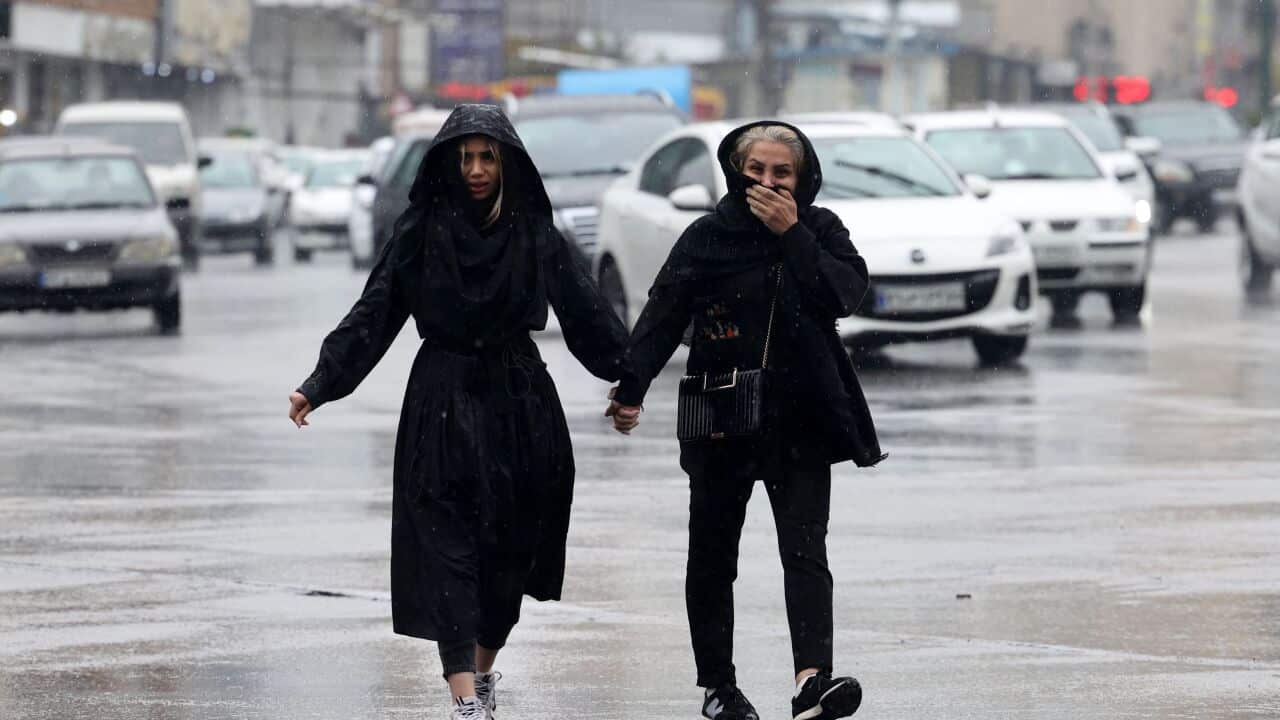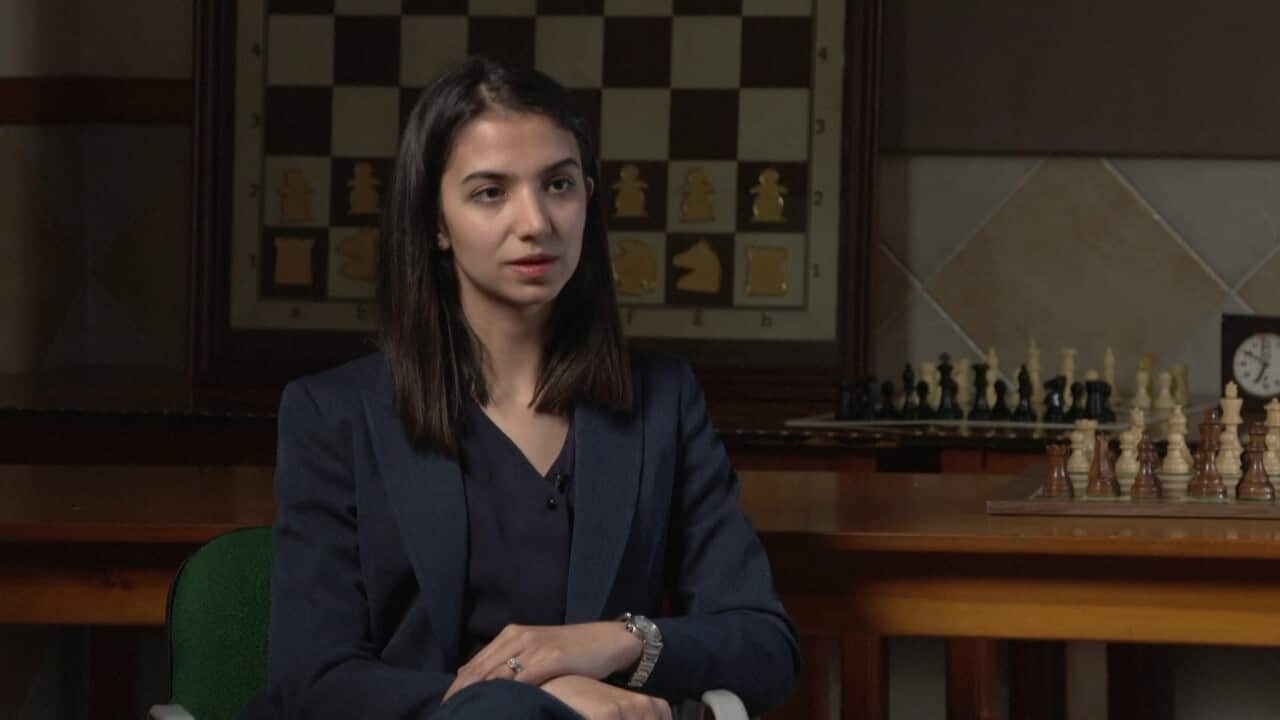

7 min read
This article is more than 1 year old
Feature
This woman was detained by Iran’s morality police. Unlike Mahsa Amini, she survived
The death of 22-year-old Mahsa 'Jina' Amini while in the custody of Iran's morality police sparked a wave of anti-government protests a year ago. For Marta, who migrated to Australia after being detained by the same police force, the memories remain vivid.
Published 2 September 2023 8:57am
Updated 2 September 2023 12:02pm
By Sandra Fulloon, Niv Sadrolodabaee
Source: SBS News
Image: At the age of 19, Marta (centre) was charged with “holding hands, laughing and joking” with a male and taken into custody. (SBS, AAP)
Marta was a teenage university student when she was arrested by morality police, in Iran’s capital Tehran.
“It was very scary. Remembering that is still very triggering for me, it makes me feel very anxious,” says Marta, 44.
“They took us to a temporary prison, me and my husband-to-be. We were separated, and harassed until late at night. There were a lot of threatening and abusive words.
“Authorities told us we would go to court, and if sentenced we would lose our university entitlement, and future careers.
“We would not be able to travel because obviously there would be a record against us. All because we had done something really, really, really wrong.”
And the crime the 19-year-old was officially charged with: “holding hands, laughing and joking,” says Marta.
“It is very stressful and unbelievable to be arrested for literally having a very normal relationship with a man that is not related to you.”
How the death of Mahsa Amini triggered global protests
Iranian-Kurdish woman was also detained by the morality police, allegedly for not wearing her hijab properly.
The 22-year-old died in police custody on 16 September 2022, sparking a movement of local and international anti-government protests.

Nationwide protests erupted in Iran after 22-year-old Kurdish-Iranian woman Mahsa Amini died on 16 September 2022 while in the custody of the state's morality police. Credit: Jaap Arriens/Sipa USA
Iran’s coroner later linked her death to a pre-existing medical condition.
Nationwide protests following her death were met with brutal force. Rights groups in Iran accuse authorities of killing and executing hundreds of protesters.
“Human Rights Watch has documented numerous incidents of security forces unlawfully using excessive or lethal force against protesters across cities in Iran,” says that organisation's Australian director, Daniela Gavshon.
“Videos show security forces using shotguns, assault rifles, and handguns against protesters who were largely peaceful and often in crowded settings, leaving hundreds dead and injured.”
The case of Kylie Moore-Gilbert and fears for activists' safety
Australian academic and author Kylie Moore-Gilbert was accused of being a foreign spy and jailed in Tehran’s notorious Evin prison for 804 days.
She has closely monitored events in Iran, since her release in 2020.
“There are fears that, in the lead up to the one-year anniversary of Amini's death, the regime could execute more protesters to deter people from taking to the streets on 16 September.

The Australian government has characterised the charges against Kylie Moore-Gilbert as "baseless and politically motivated". Credit: Iranian State Television
“Over the past year, protesters including young men, some of them still teenagers, were executed or given the death sentence simply for protesting in the streets. And this has happened in a number of cities across Iran."
Moore-Gilbert was arrested in Tehran in September 2018, as she was leaving the country after attending an academic conference.
Held in solitary confinement, she went on hunger strikes and her health deteriorated.
“Solitary confinement for longer than 15 days is classified as a form of torture by the United Nations,” she says.
“Yet Iran routinely uses solitary confinement as a form of psychological torture, to break the prisoner for purposes of interrogation.”
Moore-Gilbert says medical treatment is also weaponised in the Iranian prison system, as an incentive to extract confessions or other information.
“I've met many prisoners who were, for instance, on diabetes medication and/or blood pressure medication. And this medication was only allowed to them in prison if they cooperated with their interrogators. It’s the same with cleaning products.
“So, prisoners who do not cooperate are basically forced to live in very inhumane, degrading and unsanitary conditions with restricted access to medical care.”
Following Amini’s death, social media videos showed women across Iran cutting their hair or burning hijabs in the streets in protest.
Increased surveillance of women, penalties for breaking 'modesty' laws
Iran's president, Ebrahim Raisi, vowed last month that laws requiring women to wear the hijab, or headscarf, would be enforced in the Islamic Republic, as a growing number of Iranian women shun head coverings.
Authorities are also proposing tougher punishments for those violating compulsory veiling laws, including lengthy prison sentences, flogging, and travel bans.
“The current crackdown is just unprecedented. And these draconian new laws are quite terrifying for women,” Moore-Gilbert says.
“Women are being harassed in the streets, in their homes, driving their cars in social gatherings simply for what they're wearing."
Authorities in Iran have also increased surveillance, installing more cameras on streets in a bid to identify unveiled women. Police have sent more than one million SMS messages, warning women to wear headscarves while in a car or face having the vehicle impounded.
“It's really reached the level of baked-in discrimination throughout every part of a woman's experience. It is gender apartheid," Moore-Gilbert says.
“In spite of all of that, large numbers of women are walking the streets, particularly in cities like Tehran, without hijab and clashing with morality police.
“These women are very brave and their resistance continues, which is quite awe-inspiring."
Planting seeds of hope
Marta was finally released without a criminal record and later migrated to Australia with her husband. She now works full-time in operations management and is studying for a Master of Business Administration at Sydney University.
However, she fears for extended family still living in Iran, including a relative who went into exile for 10 years and is now working as a journalist and activist in Tehran.
“She is constantly harassed and living in fear because of what she does. But she does not stop, even though she is being persecuted," Marta says.

At the community garden, Marta plants trees that are "symbolic of Persian culture”, such as the pomegranate. Source: SBS News / Sandra Fulloon
“We plant particular trees that are symbolic of Persian culture,” she says. “There are pomegranates, figs and olives. By planting these trees, we are sending a strong message of hope to the community, helping to raise awareness.
Many in Australia’s Iranian diaspora are expected to rally on the anniversary of Amini’s death.
Those living in Iran will be more cautious, according to garden volunteer Amir.
“It is very difficult to protest in Iran. Even if you come together as group of three or four, they're going to capture you," he says.
“It was like a scene of a war in some streets of Tehran. But people are smart there. They will look for alternative ways to show their anger."

Volunteers tending newly planted trees in Sydney. Source: SBS News / Sandra Fulloon
“I'm struggling with anxiety and depression because I have a teenager, so watching young people get killed in Iran is heartbreaking.”
There are memorial gardens in both Sydney's north and Byron Bay that honour 10-year-old Kian Pirfalak, who died last November in Iran during an attack by security forces.
Volunteer Behzad Vafa describes planting trees as an important gesture.
"This is not just a local initiative. Iranians around the world, including many places in Australia - Sydney, Canberra, Brisbane, Bryon Bay - are remembering the sacrifices made and the people who lost their lives in the struggle for a more just society.”

Volunteers at Kian Garden in Byron Bay. Source: Supplied / Kian Garden
“We are driven by their passion as well and we know it will yield results,” she says.
“This movement is going to grow day by day and we are not going to stop until we reach our goal.”
Share




